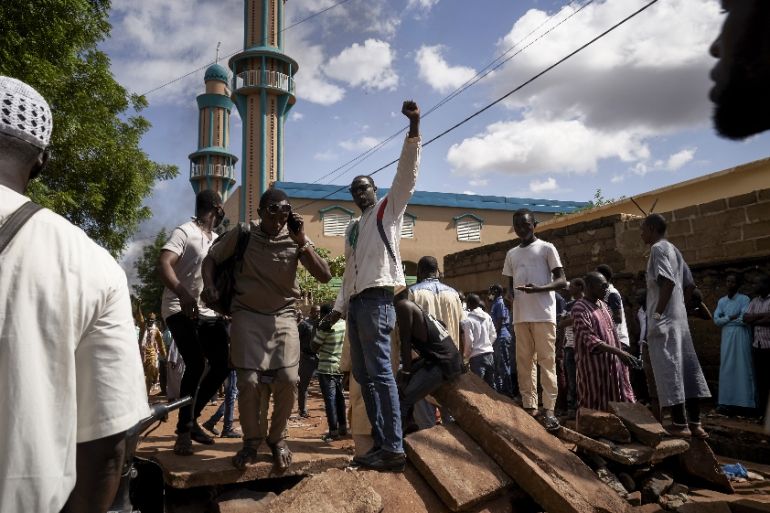Scattered protests in Mali after crisis mediation falters
Opposition spurns ECOWAS mission as list of reform proposals excludes President Keita’s resignation, a key demand.

Opponents of Mali’s President Ibrahim Boubacar Keita have erected barricades in the capital Bamako, after international mediators have failed to resolve a weeks-long political crisis that has shaken the West African country.
Keita is locked in a standoff with an opposition alliance calling for his resignation. A mediation mission from the 15-nation Economic Community of West African States (ECOWAS) ended Sunday after failing to reconcile the two sides.
ECOWAS issued a list of reform proposals, but the opposition spurned the proposals as they did not address its main demand – that Keita resign.
The president and the opposition June 5 Movement (also known as M5) have for weeks been locked in a political standoff, which spiralled into violent clashes earlier this month, leaving 11 dead.
But the uncertain conclusion of the mediation has left the path to exiting Mali’s impasse uncertain.
On Monday, a government official said the leaders of Ivory Coast, Ghana, Senegal and Niger were due to arrive in Bamako on Thursday for a summit as Mali’s political crisis deepens.
Meanwhile, in outlying suburbs of Bamako, some protesters erected barricades and burned tyres on Monday, AFP journalists reported.
Al Jazeera’s Nicolas Haque reporting from Dakar in neighbouring Senegal said that protesters have tried to block two main bridges that connect Bamako’s north and the south as well as roads in the historic town of Timbuktu located in the north.
“That’s following a call to action by the M5 … [for] a day where protesters are trying to turn the capital and cities into ghost towns by blocking major arteries and that’s because they reject the ECOWAS recommendations. It falls short of their demands,” Haque said.
|
|
Protesters are calling for Keita’s resignation as well as for the national assembly to be dissolved.
“They said that the parliamentary election that took place … is not a legitimate election, so they want a revote on that.
“It seems that the ECOWAS is saying that dialogue will continue despite this mission that’s described by this M5 movement as a failure, that there will continue to be some sort of a discussion,” Haque said.
Bloodiest bout of political unrest
Keita has been in power since 2013. The June 5 Movement has been tapping into deep-seated frustrations about the 75-year-old president’s perceived failures in tackling the dire economy, corruption and the country’s eight-year-long conflict with armed fighters.
Many Malians are also incensed at the outcome of long-delayed parliamentary elections in March and April that handed victory to Keita’s party.
|
|
The opposition staged two anti-Keita protests last month and one on July 10, which turned violent after protesters stormed the premises of a state broadcaster, blocked bridges and attacked the parliament.
Three days of clashes between protesters and security forces followed, leaving 11 dead and 158 injured, according to an official tally, in the bloodiest bout of political unrest in years.
ECOWAS mediators on Sunday suggested forming a new unity government and appointing new judges to Mali’s constitutional court, who could potentially re-examine disputed election results.
However, the June 5 Movement had earlier rejected any outcome that does not include Keita’s departure.
West African mediators said they would set up a technical committee to oversee their recommendations, suggesting that talks between the two parties may continue.